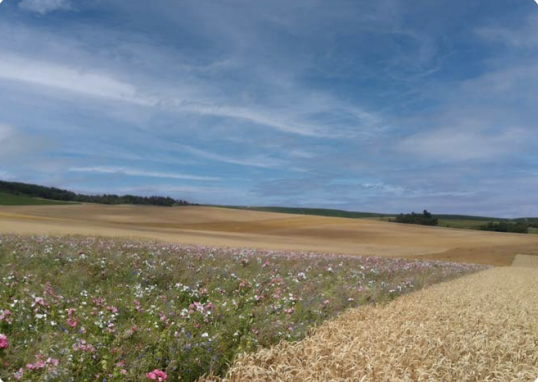Mondelēz 2023 Snacking Made Right Report: Climate Risks
Rhea-AI Summary
Mondelēz International's 2023 Snacking Made Right Report outlines the company's comprehensive approach to climate change. The strategy interconnects goals across responsible sourcing, social sustainability, and human rights. Key focus areas include:
1. Enhancing social sustainability and respecting human rights in their value chain.
2. Pursuing net-zero carbon emissions across the full value chain by 2050, with a 35% reduction target by 2030.
3. Aiming for no deforestation across primary commodities by 2025, focusing on cocoa, palm oil, soy, and paper materials.
4. Increasing regenerative agricultural practices to improve resilience and reduce carbon emissions.
The report highlights Mondelēz's signature programs like Cocoa Life, which reached around 243,000 cocoa farmers in 2023, and efforts in sustainable palm oil sourcing. The company emphasizes collaboration with industry partners and transparency in reporting progress towards its climate goals.
Positive
- None.
Negative
- None.
News Market Reaction 1 Alert
On the day this news was published, MDLZ declined 0.70%, reflecting a mild negative market reaction.
Data tracked by StockTitan Argus on the day of publication.
NORTHAMPTON, MA / ACCESSWIRE / July 18, 2024 / Mondelēz International
Our approach to climate change is broad, interconnecting our goals across areas like responsible sourcing, social sustainability and human rights.
Our approach also links our carbon emission-reduction goals, our leadership in sourcing ingredients more responsibly, and our commitment to social sustainability and human rights across our value chain. Every element of our approach reinforces the other. Indeed, our ingredient-sourcing programs are where most of our carbon emissions-reduction work and social sustainability efforts live. So as part of our signature sourcing programs for our key ingredients, such as cocoa and wheat, we are working towards supporting more resilient landscapes, communities and robust human rights to help provide lasting economic, environmental and social benefits for the communities involved.
CLIMATE RISKS AND RESILIENT COMMUNITIES
For us at Mondelēz International, more sustainable snacking is part of a future where people and planet thrive together. Operating at global scale means we can have a meaningful positive impact by encouraging practices that respect land rights and investing in innovation and technology to increase transparency and measure impact at scale across our supply chain.
Identifying and managing climate change-related risks is part of our ERM process, enabling us to expand and deepen our understanding of our impact on the planet, inform our strategies and ultimately sharpen and enhance our approach. Find out more in Corporate Governance.
Our climate strategy encompasses our goal to decarbonize our end-to-end supply chain by 2050 in line with the SBTi guidance and following recognized carbon accounting standards (GHG Protocol). As such, we are focusing on the reduction of our Scope 1, 2 and 3 GHG emissions.
Our metrics are aligned with the SBTi requirements across our value chain including Scopes 1,2 and 3 reduction targets as well as breaking emissions out into FLAG (Forest, Land and Agriculture) and non-FLAG related emissions. We report on our metrics and goals annually in our Snacking Made Right report and CDP Climate disclosure.
Our approach has followed the recommendations set by the TCFD. We continue to monitor this space so that our approach remains relevant and transparent, and continue to strive to provide our stakeholders with relevant information on climate-related issues.
CLIMATE CHANGE-RELATED RISKS THAT INFORM OUR STRATEGIES
Physical risks include the increasing frequency of extreme weather events and natural disasters, effects on water availability and quality, and biodiversity loss. These impacts increase risks to the global food production and distribution system, and to the safety and resilience of the communities where we live, work and source our ingredients. They could also further decrease food security for communities around the world. Transition risks include increased focus by federal, state and local regulatory and legislative bodies around the world regarding environmental policies relating to climate change, regulating GHG emissions (including carbon pricing or a carbon tax), energy policies, disclosure obligations and sustainability, including single use plastics.
For more details please visit our Annual Report.
OUR CLIMATE RISK STRATEGIES
Key strategies that help to make us more resilient:
1. ENHANCING SOCIAL SUSTAINABILITY AND RESPECTING HUMAN RIGHTS
We strive to make sure that the rights of people in our value chain are respected and promoted, and that the communities where we operate are more resilient. To this end, we focus on key areas for greater impact, including addressing human rights risks in sourcing key commodities, and working to improve living wage and due diligence in our own operations.
Find out more in Social Sustainability & Human Rights.
2. OUR APPROACH TO NET ZERO CARBON
We've been on a path to reduce our carbon emissions for several years now, and took a key step in 2021 to set our long-term target of net-zero GHG emissions across our full value chain by 2050.
Most recently, our end-to-end emissions reduction targets of
Find out more in Our Carbon Footprint.
3. AIM TO SEEK NO DEFORESTATION ACROSS PRIMARY COMMODITIES BY 2025
Deforestation doesn't only contribute to global climate change - it also has a serious impact on local communities and ecosystems. At Mondelēz International we're aiming for the end of deforestation across our primary commodities over the next two years. Our phased approach means we aim for cocoa, palm, soy, and paper materials placed on the market after December 30, 2024 and used by our European business, to be deforestation free - with our goal for other regions to follow by December 31, 2025. The cutoff date is December 31, 2020 in accordance with EU regulations and SBTi guidance. This is the date after which deforestation is counted in a company's supply chain, meaning that products have to be produced on land that has not been subject to deforestation or forest degradation after 31 December 2020.
When it comes to deforestation, two of the commodities we source - cocoa and palm - are regarded as at-risk. We work closely with our key cocoa and palm suppliers to supply us with deforestationfree cocoa and palm. We also call on our suppliers, including those of soy, pulp and paper, to take steps to end deforestation in their own supply chains.
Our full deforestation free position is available on our website.
Cocoa
It's been a decade since we launched our signature sustainability program, Cocoa Life, which takes an integrated approach to help tackle the root causes behind the social, economic and environmental challenges faced by cocoa farming. We've carefully monitored its progress, mapping the farms registered and partnering with Global Forest Watch to monitor the forests via satellite technology. Cocoa Life continues to grow, and we're aiming to source all the cocoa volumes we need for our chocolate brands via the program by 2025.
Cocoa Life isn't the only example of our leadership in this area. It was in 2015 that Mondelēz International first raised the issue of cocoa-driven deforestation at COP21 in Paris. Two years later, we became a founding member - also with the Governments of Côte d'Ivoire and Ghana and 36 other chocolate and cocoa companies - of Cocoa and Forests Initiative (CFI). Today, CFI is a leading publicprivate partnership to help address deforestation and restore forests in cocoa growing areas.
Find out more in Cocoa Life.
Palm Oil
We've been RSPO certified since 2013. We gather information on the mills where our direct suppliers source from, which we make public, while at the same time we continue to engage with our direct suppliers to help tackle environmental and social challenges in the supply chain.
The Palm Oil Action Plan (POAP) we have in place makes our suppliers responsible for preventing deforestation in their own operations or supply chains. This requires them to map and monitor all plantations and engage with any that fail to comply.
At Mondelēz International we only account for a small fraction of the total demand for palm oil. To help drive wider change, we're involved with many other organizations that are also committed to improving the palm oil supply chain across the world. These include bodies like the Consumer Goods Forum Forest Positive Coalition (CGF FPC), the Consumer Goods Forum Human Rights Coalition (CGF HRC), the Palm Oil Transparency Coalition (POTC), the Palm Oil Collaboration Group (POCG) and the Roundtable on Sustainable Palm Oil (RSPO).
Find out more in Palm Oil.
Soy
The comparatively low levels of soy that we buy means we have little direct influence over the sector. That said, we apply CGF sourcing guidelines to purchasing of this ingredient.
We also track indirect emissions from the dairy industry that arise from the use in cattle food of raw ingredients such as soy grown in deforested areas. That gives us the insight we need to buy most of our dairy ingredients from suppliers whose farmers are selective about what they feed their cows. It also helps us engage openly with our suppliers on the need to provide dairy products based on deforestation-free cattle feed.
Pulp and Paper
For pulp and paper, we require the mills and printers that supply us to be Forest Stewardship Council (FSC) certified. As part of our strategy implementation by end of 2025, we aim to leverage chain of custody certification programs to confirm that the virgin paper packaging we use is sourced from sustainably managed forests.
Ending deforestation needs sector-level transformation. We support an approach in which key players along the value chain work collectively to tackle systemic issues at the industry, country and landscape-level. One example is the CGF FPC.
Find out more in Sustainable Packaging.
Raw Materials - Cocoa
Our signature program, Cocoa Life, was created in 2012 to help tackle the complex, interconnected challenges in the cocoa value chain. In 2023, our Cocoa Life program reached around 243,000 cocoa farmers (1), and approximately
Two key elements drive our cocoa emissions reduction: agroforestry and farming practices. Conserving the land and forests is important for future generations. Forests help stabilize the climate: They regulate ecosystems, protect biodiversity, drive more sustainable growth - and play an integral part in the carbon cycle. We support farming communities with the right on- and offfarm tree planting activities and apply farm mapping technologies and agroforestry techniques to monitor progress.
Building on our work from 2022, we're continuing to expand our list of defined customized emission factors that will help us to reduce our carbon emissions intensity. In doing so, we're using data to translate our interventions in deforestation prevention and agroforestry as well as farming practices into custom emission factors. In our major sourcing countries, this approach is resulting in lower emissions per tonne of product than we would obtain with generic emission factors.
Find out more in Protecting & Restoring Forests.
Raw Materials - Dairy
Dairy is an area in which we have limited scale within the industry, but an important focus area in our footprint. To maximize our efforts, we have taken a two-pronged approach to help reduce carbon.
Find out more in Dairy.
4. INCREASING REGENERATIVE AGRICULTURAL PRACTICES
To help improve agricultural resilience, we're helping to transform agricultural production into regenerative systems while reducing carbon. We are focusing on agroforestry landscapes, biodiversity and regenerative practices across our key ingredients, including cocoa and wheat. This involves participation in sector-wide initiatives and coalitions with multiple stakeholders.
Find out more in Protecting & Restoring Forests.
"Our climate strategy builds on the foundation of many years of community collaboration, as is seen for example in our signature sourcing programs for key raw materials such as Cocoa Life and Harmony Wheat. It is the combination of social, economic and environmental objectives that we believe holds the key to success."
Michael Weber
Senior Director, Climate & Environment,
Mondelēz International
(1) Reported information for the period from January 1, 2023 to December 31, 2023 covers Brazil, Cameroon, Côte d'Ivoire, Dominican Republic, Ecuador, Ghana, Indonesia, India, and Nigeria unless otherwise stated (which differs from prior years). This data is provided by third parties. Reported information based on latest estimate; independent, third-party verification inprogress. Any updates, if needed, will be included in the ESG Datasheet.
(2) Goal and reported information for cocoa volume sourced is based on a mass balance approach, which means that the equivalent volume of cocoa needed for the products sold under our chocolate brands is sourced from the Cocoa Life program. Reported information for the period from January 1, 2023 to December 31, 2023 includes volumes from cocoa producing countries Brazil, Côte d'Ivoire, Dominican Republic, Ecuador, Ghana, Indonesia, India, and Nigeria unless otherwise stated (which differs from prior years). Excludes markets where Mondelēz International does not sell chocolate brands. Reported information based on latest estimate; independent, third-party verification in-progress. Any updates, if needed, will be included in the ESG Datasheet.
View the full 2023 Snacking Made Right Report

View additional multimedia and more ESG storytelling from Mondelēz International on 3blmedia.com.
Contact Info:
Spokesperson: Mondelēz International
Website: https://www.3blmedia.com/profiles/mondelez-international
Email: info@3blmedia.com
SOURCE: Mondelēz International
View the original press release on accesswire.com








